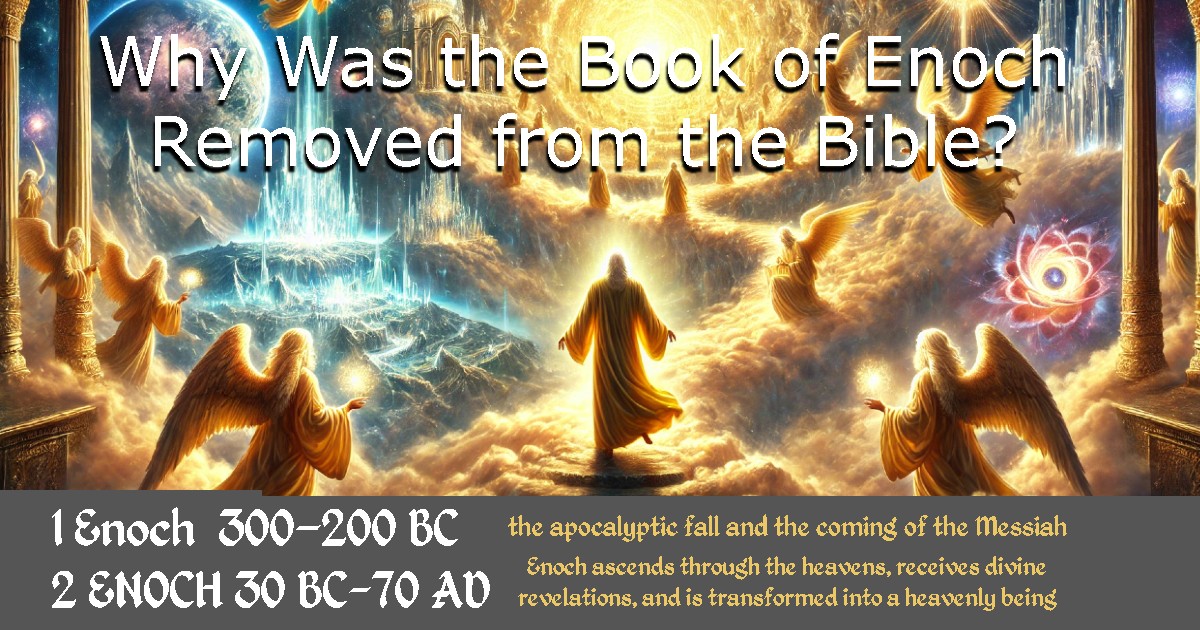The Book of Enoch is one of the most mysterious and controversial ancient texts ever written. Revered by some early Christian groups, directly quoted in the New Testament, and yet completely excluded from most biblical canons—why was it removed? Was it censored due to its apocalyptic revelations? Or was it a threat to early Church doctrine? To answer this, we must dive into ancient texts and scholarly analyses that reveal the shocking truth behind its disappearance.
The Book That Walked with the Bible
The Book of Enoch was widely read and respected in ancient Judaism and early Christianity. In fact, Jude 1:14-15 directly quotes 1 Enoch 1:9, stating:
“Enoch, the seventh from Adam, prophesied about them: ‘See, the Lord is coming with thousands upon thousands of his holy ones to judge everyone…'”
This means that the author of Jude, one of the canonical books of the New Testament, saw Enoch as a legitimate and divinely inspired text. Yet, despite this direct reference, 1 Enoch was later removed from most biblical canons. Why?
A Threat to Doctrine? The Watchers and the Fallen Angels
One of the most controversial sections of 1 Enoch is the Book of the Watchers (Chapters 1–36). This portion describes fallen angels (Watchers) who descend to Earth, mate with human women, and produce the Nephilim—giant hybrid beings mentioned in Genesis 6:1-4. The text goes into disturbing detail about how these fallen angels taught humans forbidden knowledge:
“And Azazel taught men to make swords and knives and shields and breastplates… and the knowledge of metals… and the use of antimony and the beautifying of eyelids…” (1 Enoch 8:1-2)
Church authorities may have found this passage problematic for multiple reasons:
- It attributes technological advancements to fallen angels rather than divine wisdom.
- It paints a complex picture of supernatural beings interacting with humans, which contradicts the simplified angelology later promoted by the Church.
- It aligns too closely with Gnostic and apocalyptic thought, which the early Church fought to suppress.
The Council That Buried Enoch
The Book of Enoch was widely used by early Christian communities, but by the 4th century, it was excluded from the official biblical canon. While no single council explicitly “banned” it, key moments in history contributed to its disappearance:
- The Council of Laodicea (363-364 CE): While this council did not list 1 Enoch among the canonical books, it reinforced a biblical structure that did not include apocalyptic texts outside of Daniel and Revelation.
- The Synods of Hippo (393 CE) and Carthage (397 CE): These councils officially solidified the biblical canon for the Western Church, omitting Enoch.
- The Jewish Rejection (1st-2nd century CE): Rabbinic Judaism also distanced itself from 1 Enoch, possibly because of its apocalyptic nature and its use by early Christian groups.
One of the most vocal critics of 1 Enoch was Tertullian (155-220 CE), an early Church Father. Strangely, though, Tertullian argued in favor of keeping 1 Enoch in the Bible, stating:
“I am aware that the Scripture of Enoch is not received by some, because it is not admitted into the Jewish canon… But since Enoch in the same Scripture has preached likewise concerning the Lord, nothing at all must be rejected by us which pertains to us.” (On the Apparel of Women, Chapter 3)
Despite his defense, 1 Enoch was ultimately discarded by the mainstream Church.
What Did the Dead Sea Scrolls Reveal?
In 1947, the discovery of the Dead Sea Scrolls at Qumran provided undeniable evidence that 1 Enoch was highly regarded among Jewish sects before Christianity emerged. Fragments of 1 Enoch were found in Aramaic among the scrolls, proving that it was in circulation among Jewish communities around 200 BCE to 100 CE.
This discovery suggests that 1 Enoch was not just a fringe book but was central to certain Jewish traditions—yet it was still mysteriously erased from mainstream Judaism and Christianity.
Who Still Accepts the Book of Enoch Today?
While most branches of Christianity reject 1 Enoch, it is still considered canonical by the Ethiopian Orthodox Church. This church, which claims to have preserved the text in its original Ge’ez language, has maintained its belief in the book for nearly 2,000 years.
A Lost Key to Biblical Mysteries
The removal of 1 Enoch from the Bible was not due to a lack of authenticity but rather a matter of theological and political control. Its vivid depictions of angelic rebellion, hidden knowledge, and divine judgment made it a threat to early Church doctrine. Yet, its influence lingers—quoted in the New Testament, preserved in Ethiopian Christianity, and now resurrected in modern biblical scholarship.
So, was 1 Enoch removed to suppress divine knowledge? Or was it simply deemed too dangerous for the common believer? Whatever the case, its echoes still haunt the pages of the Bible today.
Sources
- The Book of Enoch, Translated by R.H. Charles (1912)
- Tertullian, On the Apparel of Women, Chapter 3
- Dead Sea Scrolls Fragments of 1 Enoch (4Q201-4Q204)
- The Council of Laodicea, Canon 60 (Historical Records)
- Jude 1:14-15 (New Testament, NIV Translation)
- Genesis 6:1-4 (Old Testament, NIV Translation)
- Nickelsburg, George W.E., 1 Enoch: A Commentary on the Book of 1 Enoch (Hermeneia, 2001)
- VanderKam, James C., Enoch: A Man for All Generations (Eerdmans, 1995)
- Collins, John J., The Apocalyptic Imagination: An Introduction to Jewish Apocalyptic Literature (Eerdmans, 2016)
- Milik, J.T., The Books of Enoch: Aramaic Fragments of Qumran Cave 4 (Oxford, 1976)

